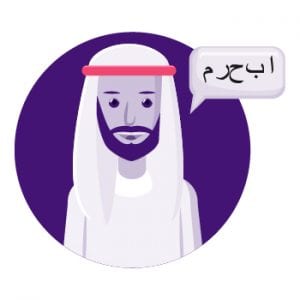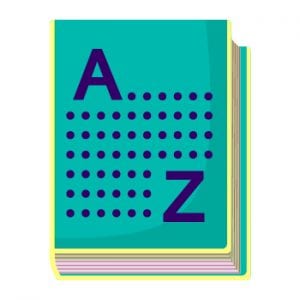
Overview of Arabic Dictionaries
Do you want to learn Arabic words? Are you looking for Arabic dictionaries? It is necessary to learn Arabic without mistakes if you want to study it for the Quran. However, a wrong dictionary can lead to a waste of energy and time and your motivation to learn Arabic literature. Don’t worry; many wonderful dictionaries and resources are available both in print and online. We will guide you about the pros and cons of different dictionaries and where to find them easily. Let’s take a look at the collection of dictionaries. If you’re looking for Arabic translators, check this out.


Overview of Arabic dictionaries
Here are some of the best-known works of renowned Arabic scholars.
Kitab-al-Ain
It is the very first dictionary of the Arabic language. Hence, it was the work of the 8th century. The author of Kitab-al-ain was Al-Khalil ibn Ahmad al Farahidi. His friend and one of his students, al-Layth bin Muẓaffar al-Kinānī, an Islamic scholar, organized this dictionary. Kitab-al-ain depends on the vast knowledge of the writer and not on any other texts. Hence, it is one of the foundational texts of Arabic linguistics. Some of the greatest scholars of the Arabic language, including Sībawayh, Hārūn bin Mūsā al-Naḥwī, al-Aṣmaʿī, Wahb bin Jurayr, al-Kisāʾī, and al-Juhdhumī were the students of Al-Khalil.
Taj al-Lugha wa Sihah al-Arabiyya
This dictionary was the work of Ismāʿīl bin Ḥammād al-Jawharī, one of the greatest linguists and lexicographers of the Arabic language. Hence, there was a revolution in Arabic lexicography after this book because it differed from the format of Al-Khalil bin Ahamad. Al-Jawhari came from the city of Farab, which is Kazakhstan nowadays. However, searching for knowledge of the Arabic language, he traveled throughout the Middle East and Arabia. The book is commonly known as Sihah and is the most used dictionary of the Arabic language.
al-Mudhakkar wa-l-Muʾannath
This was the work of a Christian poet or writer, Ibn al-Tustarī al-Kātib. Hence, al-Mudhakkar wa-l-Muʾannath is a dictionary of the genders of Arabic nouns.
Maqāyīs al-Lugha
This was the work of one of the famous scholars of the Islamic world, Ibn-Faris. He was a Persian Islamic scholar. Hence, he is famous for his books on Arabic poetry and linguistics. Maqayis al-Lugha is a mix of five books:
- Kitāb al-ʿAin of al-Khalīl bin Aḥmad,
- Gharīb al-Ḥadīth and al-Gharīb al-Muṣannaf of Abū ʿUbayd al-Qāsim bin Salām al-Harawī,
- Kitāb al-Manṭiq of Ibn al-Sikkīt (d. 858 CE) and
- Jamharat al-Lugha by Ibn Durayd.
Al-Muhkam wa-l-Muhīt al-Azam
The author of Al-Muhkam was Al-Sahib ibn Abbad. He was a blind scholar of the Arabic language. However, it is one of the extensive and larger Arabic dictionaries. Al-Muhkam has 28 volumes in print.
Majmaʿ Biḥār al-Anwār fī Gharāʾib al-Tanzīl wa Laṭāʾif al-Akhbār
Bihar al-Anwar was the work of Muhammad al Fatinni. He is the great Indian scholar of Hadith. Hence, he was from the lineage of the close companion of the holy prophet (SAW), Abu Bakr al-Siddiq. Bihar al-Anwar consists of phrases, usage, and unusual words from the Quran and Hadith.
al-Mughrib fī Tartīb al-Muʿrib
Al-Muṭarrizī al-Khawārizmī wrote this dictionary. Hence, he was a famous Arabic as well as Persian Islamic scholar. He was the successor of al-Zamakhshari. Khawārizm was the homeland of Al-Mutarrizi , which was one of the world’s active centers of knowledge in his time. However, Al-Mughrib consists of the name of places and many Persian terms.
Al-Shawarid
Al-Ḥasan bin Muḥammad al-Ṣaghānī was the well-known scholar of Arabic Philology, Hadith and Quran. However, he is also the best Arabic-language lexicographer. The concerns of Al-Shawarid are the usage of Arabic words and phrases, non-standard pronunciations.
Al-Miṣbāḥ al-Munīr fī Gharīb al-Sharḥ al-Kabīr
It is more than a technical dictionary. Hence, Al-Misbah has a wide scope and focus on explaining technical words used in the science of fiqh. Al-Misbah was the work of Al-Fayummi who was the Egyptian lexicographer of the 14th century. However, He was also the imam of a mosque in Syria.
These are only a few of them, there are many other online dictionaries available in one place. You can go and check out Arabiclexicon.Hawramani.


English-Arabic/Arabic-English dictionaries and resources
Several Arabic-English dictionaries and resources for students are also available on the internet. The education industry benefits from various resources, including English-Arabic and Arabic-English dictionaries, ranging from standard to convenient pocket dictionaries. These essential tools provide basic roots and quality paper materials to students, offering comprehensive education solutions and facilitating language learning in diverse settings.
The Librarie du Liban Publishers offers a comprehensive range of English-Arabic and Arabic-English dictionaries, including the renowned works of Edward William Lane and Rohi Baalbaki. Their business partnership with XanEdu ensures constant updating and broad-spectrum coverage, catering to B2B partners seeking high-quality instructional materials. With alternative translations, audio output, and a focus on passive participles and triliteral roots, their bilingual dictionaries serve as indispensable K-12 resources in classrooms worldwide.
The Beirut School Dictionary, alongside Goodword Books and the York Dictionary of Linguistics, exemplifies their commitment to providing top-tier language resources. Whether it’s Cambridge English or peanut butter translations, Librairie du Liban’s offerings cater to diverse linguistic needs while maintaining a competitive Business-Language Sale Price.
Some of them include:
Lanes Arabic English lexicon
It is one of the major Arabic-English dictionaries from the 19th century. Hence, it is based on 112 sources—the work of Lane after his nephew, Stanley Lane-Poole, finished his death.
Pros:
Its completeness and thoroughness make it one of the best. However, It covers a huge amount of details.
Cons:
It is not a resource for beginners. Hence, the dictionary comes in 8 volumes and is extremely advanced.
Mukhtaṣar al-ʿIbārāt li-Muʿjam Muṣṭalaḥāt al-Qirāʾāt
The author of this Arabic-English dictionary was Dr. Ibrāhīm b. Saʿīd b. Aḥmad al-Dawsarī. Hence, This is the dictionary of terminology in the field of qira’at. Al-Daswari was the great Professor of Quran studies and Islamic scholar at the Islamic University of Imam Muhammad ibn Saud in Riyadh.
Al Mawrid dictionary
This dictionary is available in pdf form at Amazon. Hence, you can also purchase its software and electronic version from Amazon. It comes in two types Arabic-English or English-Arabic dictionary. However, it is very useful for students who want to learn Arabic. Al Mawrid is one of the excellent resources available online.
Pros:
- It is very easy to use. Hence, you only need to have basic knowledge of Arabic Grammar.
- Al Mawrid helps students understand vocabulary because of its Arabic synonyms.
- The electronic version of it is very useful and saves time.
Cons:
Some information in the present tense of 3-letter verbs, forms of the verbs, and the plural of nouns are missing. However, overall, it is a very good resource to learn Arabic.
Sakhr
It is a completely online dictionary. Hence, it is very similar to Mawrid. The English-Arabic dictionary is also available. Moreover, Arabic synonyms are also one of its features.
Pros:
- Easy to use and requires only the knowledge of basic grammar.
- Provides Arabic synonyms.
Cons:
- Arabic translations are sometimes inaccurate. However, sometimes information is missing as in Al Mawrid.
- You have to type in Arabic to use it.
It is available at http://dictionary.sakhr.com/.Overall it is easy and good to use instead of its shortcomings.
Google Translate and dictionary
It is a very handy and helpful resource for beginners. Hence, Google Translate and the related dictionary are fast and very useful occasionally. It provides Arabic-English/English-Arabic translations.
Google Translate offers a comprehensive modern English-Arabic dictionary with bilingual entries, including Arabic pronunciations and English meanings, supplemented by audio pronunciations for better understanding. Additionally, it provides online resources for language directions and translation, allowing users to access Internet resources and verify translations.
With its extensive database, Google Translate facilitates accurate translations and enables users to revise content as needed, ensuring the quality of translations. Moreover, it offers additional sentences and examples to aid comprehension and usage.
When utilizing Google Translate, it’s beneficial to consult an Arabic-English dictionary, which not only aids in understanding verb forms and the core meaning derived from Arabic root words but also provides accurate English translations.
A language expert recommends relying on an alphabetical dictionary for a comprehensive approach to improving translation accuracy and linguistic understanding.
Google Translate and Dictionary offer many resources for language learners, including the Collins Essential – Arabic Essential Dictionary and the Muhit Oxford Study Dictionary, providing definitions and explanations of root words. With their Pocket En-Ar and Pocket Ar-En dictionaries, alongside the Arabic-English Illustrated Dictionary, learners can easily access basic root letters and relevant K-12 course materials.
Moreover, their partnership with XanEdu resources ensures access to comprehensive K-12 reading comprehension resources. For advanced learners, the E. W. Lane dictionary offers in-depth insights into Arabic root words. Collaborations with business partners enhance their offerings, ensuring competitive business-language sale Prices. The contributions of linguists like Rohi Baalbaki and Munir Baalbaki further enrich their Dual Dictionary – English-Arabic—catering to diverse language needs, including Arabic-English translations.
Pros:
- The interface is very sleek, and its speed is very good.
- You don’t require grammar knowledge, making it very easy to use.
Cons:
- Information is present in a very small amount.
However, it is a good resource overall.
Glossary of Madinah books
It is a must-have for the students, especially for the Madinah books. Hence, the glossary is straightforward to understand. It also provides additional examples and is famous for its completeness. One of the cons is that it only knows the Madinah books. Overall, it is one of the best resources. It is available at Google Books.
The famous dictionary “Glossary of Madinah Books” by Paul Starkey, known for its standard and pocket versions, is widely embraced in the education community. Root letters and basic meanings, presented through a thoughtful root arrangement, enhance student success. The Illustrated English-English-Arabic Dictionary by Librairie du Liban Publishers is an invaluable resource for understanding the basic meanings of terms in the Glossary of Madinah books.
Education experts recommend these learning materials, including content books made of quality paper and cardboard books, offering customizable course materials through custom book services tailored to the needs of Arabian language learners.
So, to sum up, our list is pretty limited, but the best ones. But hopefully, it will help you for sure. If you want to gain more knowledge then there is a vast variety of collections of Arabic dictionaries all over the internet. You can also use Arabic-Arabic dictionaries to expand your Arabic vocabulary. However, if you want Arabic translations, our services are always open. You can contact us through our website for any assistance that you need.



Sorry, the comment form is closed at this time.